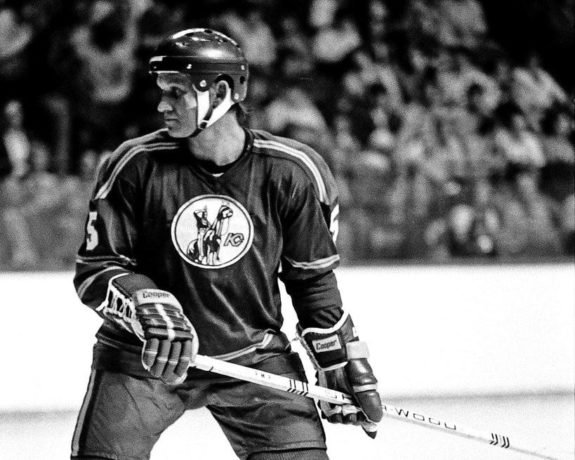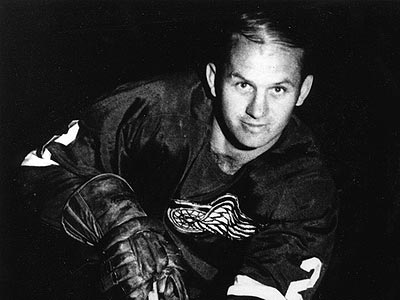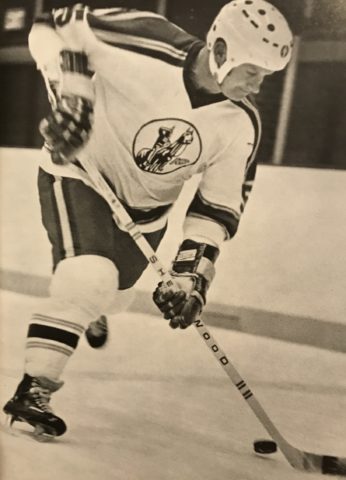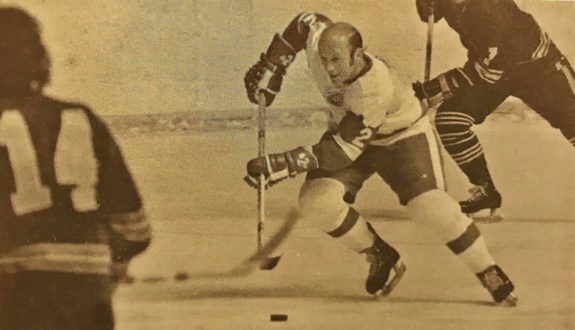
 Nathaniel Oliver
The Hockey Writers
Nathaniel Oliver
The Hockey Writers
73
Reads
0
Comments
One for the Ages: Gary Bergman’s 1975-76 NHL Season
By the time that Gary Bergman became a member of the Kansas City Scouts, he was 37 years old and a veteran of nearly 800 NHL regular season games. The primary factor behind Bergman’s longevity in the league was that his all-around game was very strong. He was always above average when it came to skating, penalty-killing, work on the power play, and making sound decisions with the puck.
Add in his robust and physical nature as a defender, and there was not an avenue to his game that Bergman did not have covered. In many ways, Gary Bergman was the prototypical defenseman.
Because he was not flashy, nor did he put up the numbers of a Bobby Orr or a Brad Park, Bergman’s contributions to his team typically went under the radar to the casual eye. Given his consistency though, he played more than a decade with the Detroit Red Wings across two different stints and even had a brief stay as a Minnesota North Star before arriving in Kansas City.

On in his years, the Scouts likely thought that in acquiring Bergman’s services that he could set an example for a much younger, inexperienced squad. In their short history as an NHL team, the Scouts had drafted six young defenseman prospects between the 1974 and 1975 NHL Amateur Drafts. The tutelage that these young blueliners could receive from a seasoned competitor like Bergman could prove invaluable.
As things would turn out, the Scouts would only play two seasons total in Missouri. 1975-76 would not only be their final in Kansas City before moving to Denver, Colorado, but it would also be Bergman’s last in the league before retiring – his only season with the franchise too.
What is key to our story though is that even at age 37 – and his better years behind him – Bergman ended up generating one of the finest offensive seasons of his 12-year NHL career. Solid enough too that he receives our vote is “Best Defenseman” in Kansas City Scouts’ history.
We look back now at how 1975-76 became Gary Bergman’s one for the ages season.
Don’t Miss Our ‘One for the Ages’ Collection
A Solid Career Well Before Kansas City
It could be exceptionally difficult for a young hockey player to crack an NHL lineup during the “Original Six” era of the league. With limited roster spots available among just six teams, some players who were good enough to play in the league may have only gotten a sniff before spending the rest of their careers in the minors.
For players like Bergman, it was patience that would prove to be a virtue. Born Oct. 7, 1938, he did not make his NHL debut until he was 26 years old. This was despite the fact that Bergman had been a Memorial Cup winner with the Winnipeg Braves of the Manitoba Junior Hockey League in 1959. Like many players from his era, he played professionally in the minor leagues first and even foremost.
From ages 19 through 25, Bergman honed his skills and developed his craft while playing in both the Western Hockey League (WHL) and the American Hockey League (AHL) during that time. The early 1960s saw him traded, loaned, or claimed six times between the two leagues and some of their NHL affiliates.
It was not until Bergman was 26 years old that he finally had an opportunity to play in the topmost league and be a full-time defenseman. On Jun. 10, 1964, he would be claimed by the Detroit Red Wings in the Intra-League Draft. That fall Bergman would make his NHL debut, playing 58 of the Red Wings 70 games. His teammates included some of hockey’s all-time greats in eventual Hockey Hall of Famers Ted Lindsay, Bill Gadsby, Alex Delvecchio, Norm Ullman, Marcel Pronovost, and “Mr. Hockey” himself, Gordie Howe.
Bergman played a tiny portion of his sophomore NHL campaign – 1965-66 – in the minors with the CPHL’s Memphis Wings, but otherwise stayed with the big club that season. From here onward he never played another game in the minors. The Red Wings would make it all the way to the Stanley Cup Final where they eventually lost in six games to the Montreal Canadiens. This would be the only Final appearance of Bergman’s career, and the last time that Detroit would play for the Cup until eventually winning it again in 1997.

Bergman would stay with the Red Wings for just shy of eight more seasons straight. After generating five goals and 30 assists in 70 games during the 1966-67 season, he finished sixth in voting for the Norris Trophy as the NHL’s top defender. Speaking to Bergman’s physicality, he eclipsed 100 minutes in penalties five times during this same stretch of seasons.
In what was more of a “hockey trade”, the Red Wings swapped Bergman for four-time Stanley Cup-winning defenseman Ted Harris (he would later win a fifth in his career) of the Minnesota North Stars on Nov. 6, 1973. Some speculated that the trade also stemmed in part to Bergman’s openly disagreeing with the decisions of Detroit’s general manager (and occasional head coach) Ned Harkness. Bergman would finish out the season as a North Star.
With Harkness out of the picture and Alex Delvecchio assuming both GM and head coaching duties for the 1974-75 season, the Red Wings brought Bergman back. On Oct. 1, 1974, Delvecchio reacquired Bergman from the North Stars in exchange for Detroit’s third-round selection in 1975’s draft, who would ultimately be Alex Pirus.
In total, Bergman played 763 games with Detroit and Minnesota. He scored 63 goals, 266 assists, and 329 points while accumulating 1,169 penalty minutes. All of those numbers being indicative of Bergman’s tremendous all-around game.
Acknowledging His Summit Series ’72 Performance
It would be remiss to not mention Bergman’s performance playing for Canada in the 1972 Summit Series against the Soviet Union.
While all who are familiar with the series are well-aware of the individual heroics from players such as Paul Henderson, Phil Esposito, Valeri Kharlamov, Bobby Clarke, and Vladislav Tretiak, Bergman’s great value to Canada often goes unnoticed. Make no mistake though – if there were an unsung hero or a most underrated player from either the Soviet Union or Canada in 1972, it would be Gary Bergman.
“Harry called me Sunday morning,” Bergman said about being an offered a spot on the Team Canada roster while heading out the door with his family. “Janie and the kids and I were just going out the door to church, and I had to stop. Janie was saying, ‘Would you get off the damn phone, we have to get to church.’ It was Harry Sinden (Canada’s head coach) on the phone asking me if I’d be part of the team.”
Bergman played in all eight games of the series, and worked mostly as a shutdown defenseman. Picking up three assists in the process, he also finished with the third-best plus/minus for Canada (plus-5) behind Bill White’s plus-7 and Henderson’s and Pat Stapleton’s plus-6. Multiple times throughout the tournament Bergman belted the sleeker Soviet skaters with hip checks. One instance was when he sent Boris Mikhailov end-over-end in the neutral zone of Toronto’s Maple Leaf Gardens in Game Two.
Bergman had two most memorable moments from the series in addition to his overall play.
Late in the third period of Game Seven in Moscow, a scuffle broke out in back of Canada’s net between Bergman and Mikhailov. As both players battled for the puck along the boards, Mikhailov draped his arm over Bergman’s face. Bergman swung over his shoulder to hit Mikhailov with an elbow and the two proceeded to exchange blows. In the process, Mikhailov decided to kick Bergman in the shins – a cardinal sin in hockey – where his skate blades actually sliced through Bergman’s shin pads and cut his leg. Both players received major roughing infractions for their duel.
This was a prime example of how high the tensions were between the two teams, especially during the Moscow portion of the series.
In what had culminated into one of the most significant scenarios in hockey history, Canada and the Soviet Union faced one another for Game Eight in Moscow for the series to be decided. With both teams entering the game with records of 3-3-1, whoever took the eighth and final game would claim victory in the series.
Though it was ultimately Henderson’s unforgettable goal that won the game for Canada by a score of 6-5 – and in dramatic fashion with multiple lead changes – it was Bergman who set the stage with his confidence. Essentially, “Bergie” called his shot. As player introductions were made before the start of the game, Bergman looked up into the crowd, raised his arm and saluted with his index and middle fingers in the shape of a “V” to signify that victory would be claimed by Canada.
Little did he realize at the time just how strongly his gesture would ring true.
Bergman Comes to Kansas City
The inaugural 1974-75 Kansas City Scouts finished as the second-worst team in the NHL. Possessing a record of 15-54-11, the Scouts ended up at the bottom of Smythe Division. Their 41 points bettered only their fellow expansion team – the Capitals – who had earned just 21 points themselves based off of an abysmal 8-67-5 record.
No defenseman for Kansas City recorded more than 22 points in scoring that first season. 15 different blueliners appeared in a Scouts uniform in 1974-75. Their three most utilized defenders – Jim McElmury (78 games), Dennis Patterson (66) and Brent Hughes (66) – were minus-47, minus-56, and minus-52 respectively.
The Scouts badly needed to improve their defense corps, and perhaps more so, bring aboard a player who could give them some legitimacy and help them save face in their sophomore 1975-76 season.
On Aug. 22, 1975, Kansas City acquired Bergman and goaltender Bill McKenzie from the Detroit Red Wings in exchange for goaltender Peter McDuffe and center Glen Burdon. This was the first of seven trades that Kansas City would make either shortly before or during the 1975-76 season, and one of three that they made with the Red Wings.
Despite the moves that the Scouts made, none of them kept the team from going 12-56-12 that second year, nor from scoring an NHL-worst 190 goals in 80 games. This would be the franchise’s final season in Kansas City before relocating to Denver where they became the Colorado Rockies.
After just six seasons in Colorado, the franchise relocated one final time when they moved to the “Garden State” in 1982 to become the far more renowned New Jersey Devils.
Bergman’s 1975-76 NHL Season

Arguably the lone bright of the Scouts last season in Kansas City was the play of Bergman. Despite being easily the oldest player on the team and a defenseman, he still finished third in Scouts’ team scoring. Playing in 75 of the 80 regular season games, Bergman scored five goals and added 33 assists for 38 points.
Those 33 helpers were his highest assist total in his 12-year career, and the 38 points were the second-most that he ever recorded in a season. Those same 38 were 17 more than the next highest scoring defenseman for the Scouts.
Kansas City lacked in a vast number of areas, but Bergman’s play and commitment to going the long haul when he quite understandably could have retired gave the Scouts at least some credibility and respectability. Even if they lost 10-0 – which happened on Nov. 2, 1975 against the defending Stanley Cup champion Philadelphia Flyers – they still possessed Bergman as a bit of a beacon for a team that faced much disappointment and adversity.
We take a look now at some of the finer moments from Gary Bergman’s 1975-76 NHL season:
Oct. 22, 1975:
In a 4-2 victory over the Washington Capitals, Bergman had his first of nine multi-point games that season. Both teams exchanged 20 shots apiece, but the Scouts were able to sink four by much maligned Capitals’ goalie Michel Belhumeur. Bergman finished the game as a plus-1 and with a pair of assists, as the Scouts received goals from Wilf Paiement, Dave Hudson and two from Gary Croteau. With the victory, the Scouts were a decent 2-2-1 to begin their season.
Nov. 7, 1975:
Facing Toronto at home in Kansas City’s Kemper Arena, the Scouts pulled to a 3-3 tie with the Maple Leafs. Bergman opened the scoring and tallied his first goal of the season when he beat goalie Wayne Thomas at 4:55 of the first. Ken Murray and Germain Gagnon earned the assists on the goal. Toronto’s Darryl Sittler would tie the score at 12:25, but the Scouts would take the lead again at 17:06 when Paiement and Bergman combined to set up Guy Charron. Neither team would score in the second, but both would exchange goals in the third until the score was knotted for good.
Nov. 26 and 27, 1975:
Bergman would score four points in just 24-hours. The Scouts and St. Louis Blues played back-to-back games with each team playing host once.
Nov. 26 was played in St. Louis and both teams battled to a 3-3 tie. Even though the Blues’ Garry Unger got the game’s first goal and ultimately scored a hat-trick, the Scouts were able to get separate goals from three of their better offensive weapons. The Scouts’ first goal came from team captain Simon Nolet at 4:55 of the second period.
With the score tied 1-1 late in the second, Blues’ goalie Gilles Gratton was penalized for holding. Bergman helped to quarterback the corresponding Kansas City power play, and he and Nolet set up Paiement to put the Scouts ahead 2-1 at 18:26. Unger would score two quick goals in the third to complete his hat-trick and give St. Louis a 3-2 lead. Not to be denied however, the Scouts’ Ed Gilbert would tie the game for good when he scored on the power play after Derek Sanderson was called for slashing. Nolet and Bergman would again earn the assists on the score.
The very next day the two teams would face each other in Kansas City. This would end up being one of Bergman’s best games of the season as he helped the Scouts take a 3-2 victory.
All five goals came in the second period of the game. Paiement scored from Craig Patrick and Gagnon just 40 seconds after the period started. Unger would get called for interference at 5:22, and Gagnon would score his first of the season on the power play from Paiement and Bergman to put the Scouts up 2-0. Less than three minutes later, Bergman made it 3-0 with an assist going to Robin Burns.
Though the Blues would endeavor to rally by getting goals from Unger and Ted Irvine late in the second period, they could not complete the comeback. With the score ending 3-2, it was Bergman’s goal that became the game-winner.
Dec. 17, 1975:
The Kansas City faithful were entertained by an 11-goal game which saw their Scouts come from behind to take a 6-5 victory over the Vancouver Canucks.
Bergman set up his team’s first two scores. Charron opened the scoring on the power play from Bergman and Larry Johnston after Vancouver’s Harold Snepsts was called for elbowing. Dennis Ververgaert would tie the game for Vancouver seven minutes later, leaving Bergman and Gagnon needing to combine to help Croteau score in order for the Scouts to regain the lead. Nolet would add an insurance goal to make the score 3-1 Scouts before the end of the first period.
The second period was almost all Vancouver. Even though Croteau would score an additional goal on the power play, the Canucks received four goals – coming from Don Lever, Chris Oddleifson, John Gould, and another from Ververgaert.
Now trailing 5-4 as they entered the third, Bergman would again factor in for his team’s scoring. He and Patrick set up another goal by Charron to make it 5-5. Halfway through the third, it would be Nolet who would score the winning marker for the Scouts when he beat goaltender Gary “Suitcase” Smith.
The three assists that Bergman earned during the game would be his highest point total of the season.
Feb. 7, 1976:
The Scouts decisively defeated the Washington Capitals by a score of 5-1. While both teams came into the league as part of the same expansion and both teams were challenged when it came to having talent, Kansas City indeed had the better edge of the two.
Washington’s Yvon Labre received a roughing penalty only 13 seconds into regulation. As he became accustomed to doing, Bergman worked the Scouts’ power play and dished a feed to Croteau for a score at 0:47; Johnston earned the secondary assist on the goal. The Capitals Jack Lynch would tie it nearly 15 minutes later but it would be for naught. The Scouts would score four straight from there, with Bergman getting his team’s fifth and final goal.
Mar. 30, 1976:
In a high-scoring, fight-filled affair, the Scouts suffered an 8-6 loss to the Los Angeles Kings. Scouts goalie Denis Herron was peppered for 52 shots during the game, and managed to stop 44 of them. The game also included a fight between the Kings’ Dave Hutchison and Kansas City’s behemoth Steve Durbano which saw both players receive calls for abusive language, fighting and a game misconduct each. Durbano picked up an additional roughing minor.
Even though the Scouts held a 3-0 lead after just 8:21 of play, the two teams traded goals and fisticuffs the rest of the way. Bergman would earn assists on Phil Roberto’s score to make it 4-2 Scouts and a goal from Croteau to make the score 6-5. Unfortunately for Bergman and Kansas City, the Kings scored three straight goals in the third to take the win.
The two assists gave Bergman the final multi-point game of his career.
Apr. 4, 1976:
In a relatively uneventful 5-2 loss to the Canucks in Vancouver, the game is actually quite notable for multiple reasons. Firstly, it was the final game the Kansas City Scouts would ever play. More important to our story though, the game would be the final one of Bergman’s career – one which would see him record his final NHL point.
With the Canucks possessing a 2-0 lead after the first period, Oddleifson got called for holding just 12 seconds into the middle frame. Once again working the point on the power play, Bergman picked up the secondary assist – Charron would get the primary – on a goal from Roberto.
Retirement and Afterward
Bergman retired from playing professional hockey after his lone season with Kansas City. At the close of his career, he had played 838 games in which he scored 68 goals, 299 assists, and 367 points. Bergman totaled 1,249 penalty minutes to boot. He was selected to play in the 1973 NHL All-Star Game as well.

Despite such solid play, the teams he played for only made the NHL playoffs three times in his 12-year career. In 21 career postseason games Bergman recorded five assists. In some ways this seems unfair, and makes one wish that Bergman had gotten more shots at winning a Cup.
Very sadly, we lost Bergman on Dec. 8, 2000 after an eight-month battle with cancer. He was only 62 years old at the time of his passing.
Prior to his death, Bergman served as the president of the Red Wings Alumni Association in 1981 and from 1997 to 2000.
Remembering Gary Bergman
Seemingly anyone who knew Bergman or had the honor to play alongside of him admired him for his attitude, the way that he carried himself and the way that he played the game. One of the last true practitioners of the hip check, he remained revered by former teammates and opponents alike many years later.
Bergman’s former Team Canada teammate Brad Park told CBC the following around the time of the late defender’s passing:
“Right away I realized what a classy guy (Gary) was in how he handled himself on and off the ice, and what a great competitor he was,” Park stated. “He had a lot of confidence in his ability and wasn’t worried about how he was going to play. He just went out and played. He was as solid a defenceman as has ever played the game.”
Fellow Summit Series teammate Bill White added some additional thoughts as well:
“He was an above-average player in the NHL at that time and he proved that during the series. Bergie gave a great account of himself in that whole series.”
While we recognize that Bergman’s career is best regarded for his Summit Series play and his time with the Detroit Red Wings, we feel that there is something quite unique about his single season with the Kansas City Scouts.
Being 37 years old, playing for a basement-dweller team comprised of castoffs and perennial minor leaguers – and yet, still playing his heart out and setting the example as to what a hockey player should be all about.
In retrospect, Bergman’s 1975-76 season as a Scout is a drop in the bucket of a very good career spent mainly in Detroit. But in considering who the man was and the effort he put forth, it would be very hard to not call Bergman’s lone season in Kansas City one for the ages.
More ‘One for the Ages’ Stories:
- 1968-69 Doug Harvey, St. Louis Blues
- 1970-71 Charlie Hodge, Vancouver Canucks
- 1970-71 Roger Crozier, Buffalo Sabres
- 1972-73 Alex Delvecchio, Detroit Red Wings
- 1972-73 Bill ‘Cowboy’ Flett, Philadelphia Flyers
- 1973-74 Bill Goldsworthy, Minnesota North Stars
- 1979-80 Dave Keon, Hartford Whalers
- 1979-80 Jim Schoenfeld, Buffalo Sabres
- 1981-82 Billy Smith, New York Islanders
- 1983-84 Tom Barrasso, Buffalo Sabres
- 1985-86 Mats Naslund, Montreal Canadiens
- 1993-94 Sergei Zubov, New York Rangers
- 1995-96 Wayne Gretzky, St. Louis Blues
- 2002-03 Steve Thomas, Mighty Ducks of Anaheim
- 2003-04 Alexandre Daigle, Minnesota Wild
- 2011-12 Ray Whitney, Phoenix Coyotes
The post One for the Ages: Gary Bergman’s 1975-76 NHL Season appeared first on The Hockey Writers.
Popular Articles

















































 Canucks Vancouver
Canucks Vancouver Sharks San Jose
Sharks San Jose Flames Calgary
Flames Calgary Avalanche Colorado
Avalanche Colorado Coyotes Arizona
Coyotes Arizona Golden Knights Vegas
Golden Knights Vegas Wild Minnesota
Wild Minnesota Red Wings Detroit
Red Wings Detroit Blues St. Louis
Blues St. Louis Blackhawks Chicago
Blackhawks Chicago Blue Jackets Columbus
Blue Jackets Columbus Hurricanes Carolina
Hurricanes Carolina Jets Winnipeg
Jets Winnipeg Predators Nashville
Predators Nashville Ducks Anaheim
Ducks Anaheim Oilers Edmonton
Oilers Edmonton Sabres Buffalo
Sabres Buffalo Rangers New York
Rangers New York Bruins Boston
Bruins Boston Panthers Florida
Panthers Florida Senators Ottawa
Senators Ottawa Lightning Tampa Bay
Lightning Tampa Bay Capitals Washington
Capitals Washington Islanders New York
Islanders New York Devils New Jersey
Devils New Jersey Maple Leafs Toronto
Maple Leafs Toronto Flyers Philadelphia
Flyers Philadelphia Penguins Pittsburgh
Penguins Pittsburgh Stars Dallas
Stars Dallas Kraken Seattle
Kraken Seattle Kings Los Angeles
Kings Los Angeles






